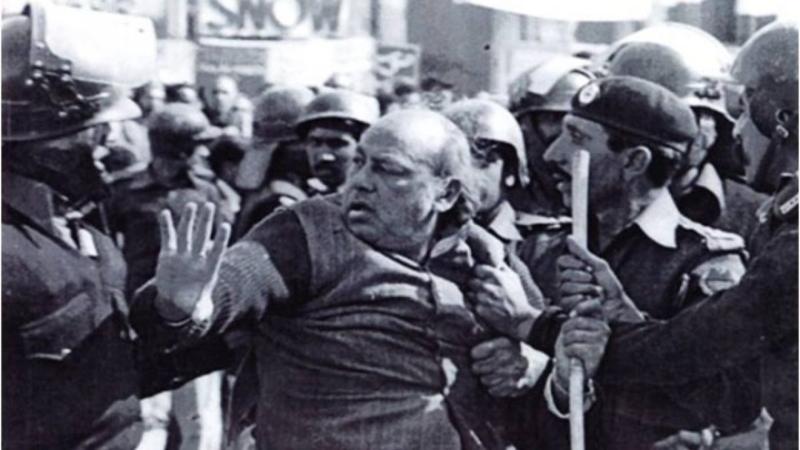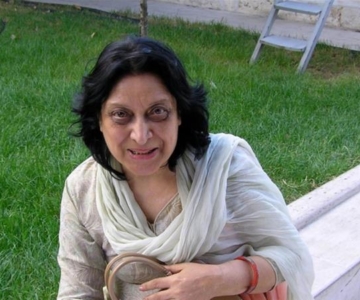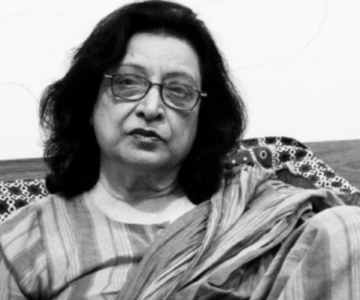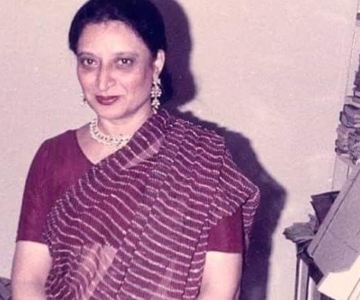Himal Magazine had published this article on the resistance poetry in Pakistan. I had uploaded it on the Pak Tea House some time back. However, I just realised that it should be published here as well..
The long spells of authoritarian rule in Pakistan have nurtured a rich dissident literary tradition. This tradition has its roots in the Progressive Writers’ Movement, which originated in colonial India with major Urdu poets and writers as its vanguards. Faiz Ahmed Faiz was, of course, the best-known torchbearer of this tradition, while other luminaries included Sajjad Zaheer, M D Taseer, Rashid Jahan, Kaifi Azmi, Ismat Chughtai, Sahir Ludhianvi and Ahmed Nadeem Qasmi, to name only a few.
With the post-Independence Pakistani state continuing the old-style approach to ruling over the masses, the progressive movement too carried on its dissent long after 1947. Those who had migrated to Pakistan faced a new reality, which, in the words of Faiz, was far from the dawn for which they had hoped. “This blemished light, this dawn by night half-devoured,” Faiz wrote ruefully. “surely not the dawn for which we were waiting.”
The progressive literary movement eventually began to be considered something of a threat to the postcolonial state, and several Pakistani writers faced severe restrictions. Among the several pioneers of the movement, it was the direct yet lyrical poetry of Habib Jalib that stirred the street, echoing the vision of the world from below. While Faiz used the classical Persian idiom, Jalib’s expression was more popular and immediate, and related easily to the common language of the streets. During the rule of General Ayub Khan, from 1958 until 1969, Jalib particularly represented the public conscience when he chanted his poem Dastoor’ (Constitution), which was about Ayub Khan’s tailor-made Ëœconstitution”. Later, this work was utilised in support of Fatima Jinnah’s (the Quaid-e-Azam’s younger sister) campaign against the general:
Aisay dastoor ko
Subh-e-baynoor ko
Mein naheen manta
Mein naheen janta
I do not accept
I do not recognise
A constitution that resembles
A morning with no light
Rejecting compromise
Jalib did not spare the administration of Zulfikar Ali Bhutto either, particularly when it began to compromise the people’s politics on the altar of expedient alliances with Pakistan’s notorious feudal barons. However, a second wave of resistance poetry blossomed in Urdu and other local languages when Prime Minister Bhutto was executed after what many saw as an illegitimate trial. Ahmad Faraz, another progressive poet, penned verses that lamented the shock and paralytic effect that Bhutto’s hanging had on the body politic.
The 11 years of General Zia ul-Haq’s rule were particularly harsh and repressive for those members of the opposition intelligentsia. As such, writers and poets increasingly chose to express themselves using symbolism and allegories, thus adding new dimensions to Pakistani literature. Enver Sajjad’s post-modern novel Khushion ka baagh (The Garden of Happiness) was a notable result of this experimentation. The novel recounted the oppressive Zia regime and, using the allegory of a garden, narrated the tales of political resistance through abstract characters and surrealism.
Jalib was again one of the most outspoken poets of the Zia period. He wrote a popular anthem for the struggle against Gen Zia: “Sar sar ko saba, zulmat ko zia / Banday ko khuda, kya likhnaa” (How can I call the toxic fumes as morning breeze? / How can I call the dark night the dawn? / How can I refer to man as god?). Pakistan did not enter its quasi-democratic phase until Gen Zia died in a mysterious air crash in 1988, at which point Benazir Bhutto came to power, after filtering her father’s legacy and the anti-Zia struggle through a package that was acceptable to the Pakistani establishment. Jalib, witnessing this compromised democratic rule, could not resist:
Haal ab tak wahi hain ghareeboan kay
Din phiray hain faqat waziroan ka
Maqrooz hai daise ka her bilawal
Paoon nangay hain benazeeroan kay
The plight of the poor remains unchanged
Only the days of the ministers have changed
Each Bilawal [Benazir’s son] of the country is indebted
And the Benazirs of the country walk without shoes
When Jalib died in 1993, his widow refused to accept a plot offered by Prime Minister Bhutto, despite the fact that the impoverished Jalib had managed to leave little for his family. He left a rich legacy within Pakistan, however, and during the hectic events of 2007, his name became increasingly prominent. This was particularly due to a recurrent feeling of compromise and pessimism on the part of Pakistani writers regarding how the forces of change had actually become collaborators of the status quo.
There were good reasons for this cynicism. A large portion of the Pakistani civil society had supported General Pervez Musharraf’s 1999 takeover and the initial years of his rule. The anti-establishment theatre groups had made peace with him, for instance, while an alarming number of secular poets and intellectuals held him up as a bulwark against the country’s growing Talibanisation. The doyens of civil society deemed him a liberator of the media and the state-run arts councils, and Gen Musharraf was even the chief guest at the International Kara Film Festival in 2006.
Over the course of 2007, Gen Musharraf’s increasingly brazen moves to stay in power led to the widespread withdrawal of support for him among the Pakistani intelligentsia. The March 2007 dismissal of Chief Justice Iftikhar Chaudhry was probably the most important turning point, as the images of an evidently beleaguered Chaudhry saying Ëœno” to the all-powerful army chief evolved into an improbable but indisputably dynamic symbol of resistance. Much was forgotten: the compromises that the chief justice had previously made; the allegations that Gen Musharraf had levelled against him; the fact that the Pakistani judiciary, for various reasons, cannot contribute to the realisation of broader social justice in the country.
It was during the subsequent campaign for the restoration of the chief justice that Mansoora Ahmed, an eminent Urdu poet and protege of the late Nadeem Qasmi, received a call from Aitzaz Ahsan, one of the country’s leading lawyers and one of the leaders of the public protests. Ahsan was calling to ask Ahmed for the text of a poem that she had written that mocked officialdom, particularly the authoritarian images that were emanating from Pakistan’s infamous state-run television news programme, Khabarnama. This poem, of the same name, was recited at one of the first public meetings held by the country’s lawyers, where the power of Urdu verse quickly, once again, became evident.
Uncle’s uniform
From March to July 2007, as Pakistan was witnessing significant political upheaval, Jalib’s legacy of awami, or populist, poetry was re-invoked as a rallying voice for the increasingly vocal crowds. This time, a poem by an unknown poet, composed in the folk Punjabi tradition, proved to be a popular charm. “Chacha wardi laanda kyon naee’ (Uncle why don’t you doff off your uniform?) gave voice to the Pakistani weariness of having to put up with military rulers. One of the most amusing of the poem’s lines urged Gen Musharraf to draw pension, and take a good rest at home. This notwithstanding, the poem was hardly offensive, and perhaps gained popularity because it was much more playful than solemn:
Nas ke tu washington jaaven
Bush noon jaa jaa masske laven
Pairi dig dig tarle pavain
Mazlooman noon tarryian lavain
Zaliman naal takranda kiyon naee
You rush to Washington all the time
And please Bush again and again
Beg at his feet all the time
And threaten the oppressed of your country
Why don’t you confront the oppressors?
That this poem was composed in Punjab province and recited in its hinterland was particularly symbolic. Traditionally, Punjab is considered the primary support base for the military, and the poem’s sensibility seemed to allude to a poignant shifting of sands in Pakistani politics. When Gen Musharraf refused to budge from power, the exasperated sequel to this poem was “Chacha wardi paee rakh / Qaum nu thallay layee rakh” (Uncle, retain the uniform / and keep the nation subjugated). There were again overt references to Pakistan’s acquiescence to the US and its war on terror”, which was killing more innocent Pakistanis than the militants it was purporting to control.
By the time the Supreme Court restored Chief Justice Chaudhry to his office on 20 July, Gen Musharraf had made a tenuous peace with Benazir Bhutto. This quickly became another issue of disquiet for many, and a Jalib-esque cry in colourful Punjabi followed by Baba Najmi:
Adhee wardi pa layee sadi bibi ne
Jarnail naal bana layee sadi bibi ne
Bhutto jayree soch ujaagar keeti si
Hathee oe dafna layee sadi bibi ne
Our Bibi [Benazir Bhutto] has worn half a uniform
And has compromised with the general
The ideals that Bhutto had enlivened
With her own hands, she has buried them
This disenchantment was largely undone, however, when Bhutto landed in Karachi on 18 October to a crowd that far exceeded her own expectations. This was the moment when another old verse reincarnated itself within the turmoil of Pakistani politics: “Har ghar se bhutto niklay ga tum kitnay bhutto maro ge?” (A Bhutto will emerge from every household / How many Bhuttos will you kill?) The ominous foretelling by this verse could hardly be missed when bomb blasts suddenly disrupted Bhutto’s homecoming rally, killing nearly 150 people. Reacting to this incident in a poem entitled “Useless, of no value”, Irfan Sattar ends with these chilling lines: “Armano aur khawabon ka yeh dher uthao / Be-masraf aur be-qeemat ye anbaar hatao” (Remove the debris of aspirations and dreams / Clear these useless piles [of human limbs] that are of no value).
|
BOL (translation Yasmin Hosain) bol ki lab azad hain tere |
Following the early-November imposition of the state of emergency, protests were small, though all the while consistent and intense. Demonstrations against media curbs adopted the famous Faiz poem “Bol” (Speak) as their logo. The lines: “Bol ki lab azad hain tere / Bol zaban ab tak teri hai” (Speak, for your lips are yet free / Speak, for your tongue is still your own) (See Video) have subsequently reverberated at nearly every demonstration. Students, academics and lawyers are charged and mobilised “perhaps in part atoning for their earlier blunder in accepting the proverbial camel into the tent. Representing the conscience of the contemporary literati, the senior poet Ahmad Faraz is also back in business, and his brutally direct (some would say seditious) poem “Mohasara” (The Siege) has re-surfaced:
Peshavar qatilo, tum sipahi nahin
Mein ne ab tak tumharay qaseeday likhay
Aur aaj apnay naghmon se sharminda hun
Mercenaries, you are not soldiers
I had praised you all along
Today, I am ashamed of all my [patriotic] songs
Faraz was unceremoniously fired from his government job as the chairman of the National Book Foundation in 2003, four years after Gen Musharraf’s first took over. Since then, he has been particularly critical of the general’s administration, and returned the civil decorations he had received.
Citizen groups have also remembered the great Sindhi poet Shaikh Ayaz. In particular, his poem “Echo the call” resonates these days:
So much time has gone by
The woes of this land
Remain still the same
That I have seen.
Rise, O Revolutionaries!
And echo the call of this land
How long shall I
Echo the call alone?
All is not lost.”Uncle” has removed his uniform, and also lifted the emergency. Elections have been announced, and mainstream parties have decided to contest and move towards a transition of sorts. The country’s lawyers remain defiant, promising to continue to protest the removal of popular judges. Other members of civil society have also vowed to join the lawyers, with some strange pairings having arisen in the push for democracy “the truncated left parties and the rightwing Jamaat-e-Islami, for instance.
These are indeed interesting, confusing times. But each time these groups of various shade gather in protest, they recite that litany of Faiz’s hopes:
Hum Dekhaingey
Hum Dekhaingey
Lazim hai ke hum bhi dekhaingey
Woh din ke jis ka wada hai
Jo loh-e-azl pe likha hai
Hum dekhaingey
Jab zulm-o-sitam ke koh-e-garaan
Ruii ki tarah ud jaingey
Hum mehkumoon ke paun talay
Yeh dharti dhad dhad dhadkeygi
Aur ehl-e-hukum ke sar upar
Jab bijli kard kard kardkeygi
Hum dekhaingey
Jab arz-e-khuda ke kabay se
Sab but uthwaaiy Jain gay
Hum ehl-e-safa mardood-e-haram
Masnad pe bithaaiy jaingey
Sab taaj uchalay jaingey
Sab takht giraaiy jaingey
Bas naam rahay ga Allah ka
Jo gayab bhi hai hazir bhi
Jo nazir bhi hai manzar bhi
Uthay ga analhaq ka naara
Jo main bhi hun aur tumbhi ho
Aur raj karaygi khalq-e-Khuda
Jo main bhi hun aur tum bhi ho
Hum Dekhaingey
Lazim hai ke hum bhi dekhaingey
Hum dekhaingey



